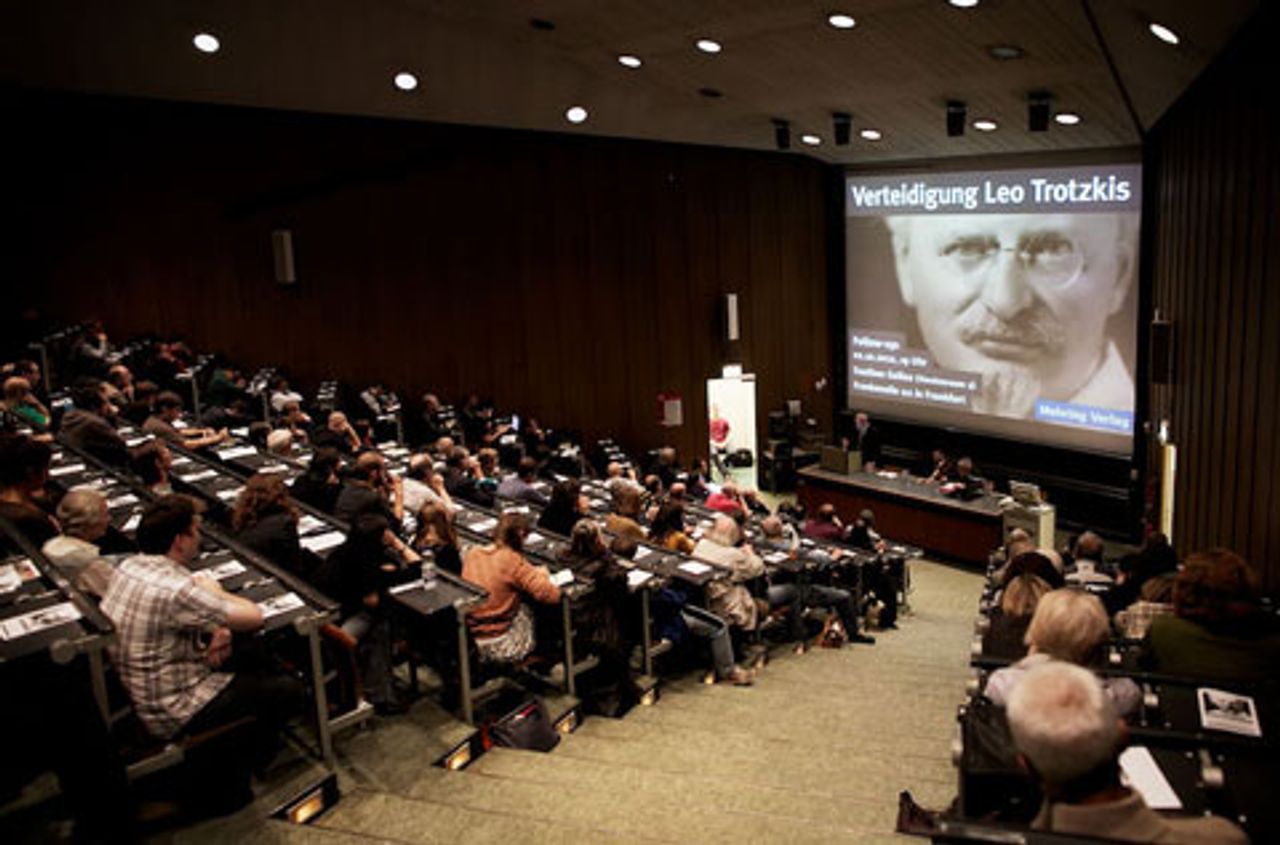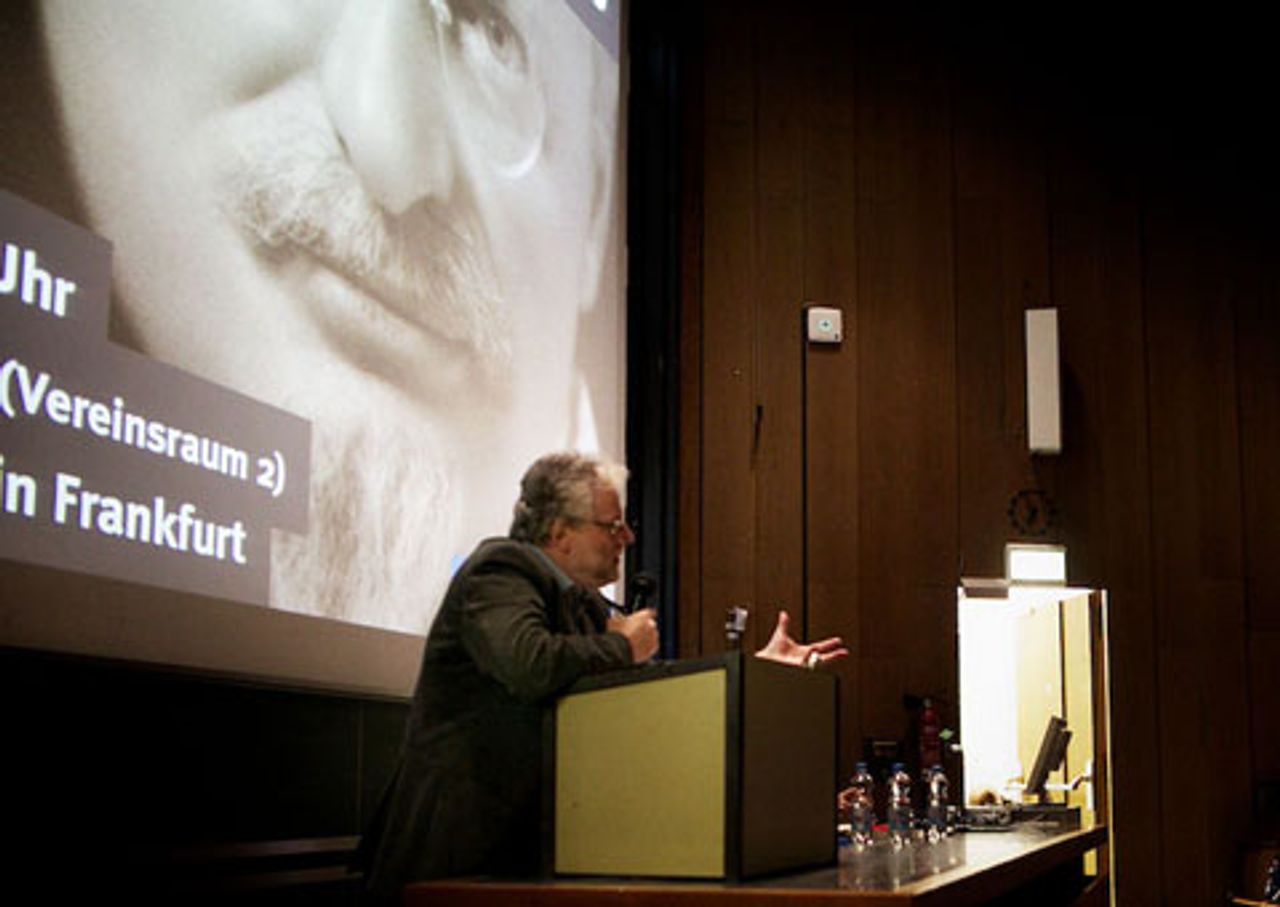David North, chairman of the international editorial board of the World Socialist Web Site, and Professor Mario Kessler, lecturer and researcher at the Center for Contemporary Historical Research in Potsdam, spoke at a well-attended meeting Thursday at the University of Mainz. The meeting, entitled “In Defence of Leon Trotsky,” was held as part of the 49th German Historians Conference.
The bi-annual conference, with about 3,000 participants, is the largest scientific gathering of its kind in Europe. It brings together professional historians, specialists from related disciplines, teachers and members of the general public.
The theme of the meeting addressed by North and Professor Kessler evoked great interest. Some 150 people, including delegates to the historians’ conference and visitors from different parts of Germany, filled the auditorium of the so-called “Muschel” (shell) to hear the presentations.
 The meeting at the University of Mainz
The meeting at the University of MainzWolfgang Weber opened the meeting by thanking the Association of German Historians and the German Historians Conference for making possible the event, which was organized by Mehring Publishers. Weber recalled the revolutionary history of the city of Mainz, where in 1793, inspired by the French Revolution, the first bourgeois democratic state was erected on German soil. The leading figure of the Mainz Republic, Georg Forster, was committed to a life-long search for truth, Weber said.
The first speaker was David North, whose book, In Defense of Leon Trotsky, published in English in 2010 was presented at the conference in an expanded second German edition. The book is a polemic against recent biographies of Trotsky by the British professors Ian Thatcher, Geoffrey Swain and Robert Service, whose works are part of what the author calls the “post-Soviet School of Historical Falsification.”
As North explains, these works are a response to renewed worldwide interest in Leon Trotsky, written from the standpoint of those who wish to counter and stifle this development. To this end, as North documents, the authors resort to slanders, distortions and blatant historical falsifications.
In his remarks, North addressed the significance of the fact that his book was already appearing in a second edition. “Fortunately, In Defense of Leon Trotsky attracted the attention of a number of highly principled scholars,” he said.
“Professor Bertrand Patenaude wrote the joint review of my book and Robert Service’s biography of Trotsky, published in June 2011 in the American Historical Review, which attracted so much attention.” This was followed, North explained, by a letter signed by 14 prominent European historians and political scientists requesting that the German publishing house Suhrkamp refrain from publishing Service’s book, on the grounds that “his work is a travesty of historical writing.”
The signatories of the letter, including Professor Kessler, hold “sharply divergent views on the nature of the Russian Revolution, the Bolshevik-led insurrection of October 1917, the nature of the Soviet regime, and the political conceptions and historical role of Leon Trotsky,” North said. If he and Kessler wrote biographies of Leon Trotsky, he added, they would undoubtedly be different works. “But we would both be working from a real historical record.”
North stressed that the task of writing a biography of such a complex and important personality as Leon Trotsky demands that the historian devote the necessary time to understand the figure and the epoch in which he lived. He is called upon to study a host of documents dealing with objective developments. Facts cannot be selected in a random or partisan fashion, but must be truthfully presented.
The biography by Robert Service, North continued, did not measure up to any of these criteria. His own analysis of Service’s biography had demonstrated that it represented a travesty of historical research. The biography was a “diatribe,” as the letter by the 14 historians quite rightly noted.
North gave several examples of historical falsifications to be found on just four pages of the 500-page Service biography. The plethora of historical falsifications, he said, served in the production of a “monstrous parody of the real historical personality” of Trotsky. The reader was confronted with a “Trotsky” who fully conformed to the political requirements of modern-day anti-communists.
North also dealt with historian Ulrich Schmid, who defended Service’s book in the Neue Zürcher Zeitung newspaper. “Schmid is arguing not as a historian,” North said, “but as a petty-bourgeois moralist. His position is, in effect, that the exposure of Service’s factual errors cannot, on ethical grounds, detract from his condemnation of Trotsky.”
North continued: “A serious historian is not indifferent to moral issues. But if moral condemnation is in order, it should emerge with compelling force out of the logic of the narrative itself. The historian should not feel the need to conceal or falsify the historical record in order to make his ‘moral’ point.”
The reason for the falsifications in Service’s biography was: “He could not extract from the historical record the materials he needed to sustain his efforts to portray Trotsky as an odious and even criminal political figure. Thus, to achieve his aim, he had to resort, as Stalin did in the 1930s, to fabrications, half-truths and outright lies.”
The World Socialist Web Site will publish North’s remarks in full at the start of next week.
Beginning his contribution, Professor Kessler declared his full agreement with North's criticism of the biography by Service.
Kessler addressed the issue of why such a book had been published by major publishing houses such as Harvard University Press in the United States, Macmillan in the UK, and, most recently, Suhrkamp in Germany. When he read the book three years ago in the US, Kessler said, he could not imagine that it would become such a political issue, and that there would be so much hype about it, first in the Anglo-Saxon world and now in Germany.
 Professor Kessler addressing the meeting
Professor Kessler addressing the meetingRobert Service had failed to take the opportunity with his biography to say something serious about the protagonist Leon Trotsky and his historical epoch, Kessler said. The reason was very simple. For Service, Trotsky was part of a communist conspiracy and not part of an era in which social changes, such as the First World War, inaugurated an age of barbarism that called for a solution to social questions and the issues of war and peace.
Kessler noted that, contrary to Service’s assertion, Service was not the first non-Trotskyist to write a biography of Trotsky. There were a number of non-Trotskyists who had written about Trotsky, such as Baruch Knei-Paz.
Since the early 1950s, multi-volume works have been published in England and the US, such as The History of Soviet Russia by E.H. Carr, the History of the CPSU by Leonard Shapiro, and subsequent books by Walter Laqueur. All of these authors—unlike Service—understood, Kessler said, that “In the case of a revolution as sweeping as the Russian Revolution, one can complain, one can regret, one can even condemn it. But such a revolution has distinct social causes. And these causes lie in the inability and unwillingness of those in power to solve social issues in any sort of humane way.”
Kessler spoke on the question of why “intellectual culture” had sunk to such a point that books by Robert Service could enjoy a short-lived success. He said that Peter Suhrkamp, the founder of Suhrkamp Verlag and a survivor of the Sachsenhausen concentration camp, would have undoubtedly refused to publish a book such as that by Service. Kessler attributed this decline in culture to the reactionary turn that began with US President Ronald Reagan and British Prime Minister Margaret Thatcher, a period in which many of the current generation of academics were trained.
A lively discussion followed the presentations, with both North and Kessler responding to questions from the audience. Several questions focused on Trotsky's attitude to the use of force and democracy.
North noted that many historians approached the issue of revolution and violence from the standpoint of a petty-bourgeois moralist. Their approach boiled down to: “Why was Trotsky a revolutionary? He should have been a liberal instead!”
This view completely ignored the realities of the period in which the Bolsheviks fought, North said. Even prior to the Civil War, Russia was no paradise. Russian society had been brutalized before 1914, and this process was exacerbated by the First World War.
During the revolution, the leaders of the Bolshevik Party were very aware of what would happen if they failed. Memories of the Paris Commune, whose defeat was followed by the murder of 20,000 revolutionary workers, were still very much alive.
From the perspective of petty-bourgeois democrats, North continued, the “crimes” of the Bolsheviks lay in the fact that they did not play with revolution, but took it seriously. If they had behaved like Salvador Allende in 1973 in Chile, these same critics would no doubt refer to them today as “great men.”
Kessler responded in a similar manner and pointed out that the use of force by Trotsky and the Bolsheviks could not be separated from the historical context. This also applied to the abolition of democracy in the party and the army at the height of the Civil War that followed the revolution.
One should not forget, Kessler said, that catastrophic conditions and famine prevailed in Russia due to the war and the Civil War. In this context, he cited Trotsky, who wrote that “no one ever considered war a school of humanity—still less civil war.”
